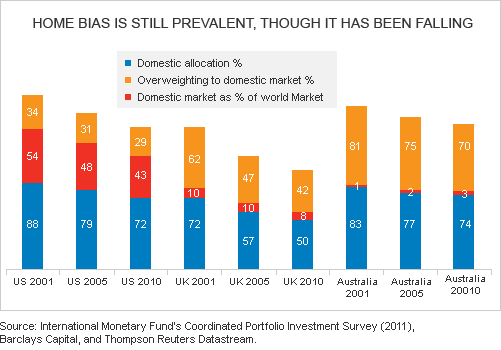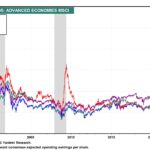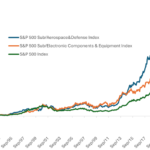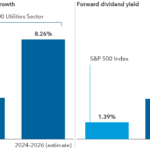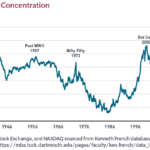One of the traits common to most investors worldwide is the concept of “home bias” with respect to investments. Home bias simply means investors prefer to invest in their home countries than in foreign countries since they may be more familiar with the companies located in their countries than abroad. However following this strategy may not be the best option for investors. For example, thousands of companies exist in other countries whose stocks may offer the potential for higher returns than the ones in home countries. According to the latest World Federation of Exchange data, the total number of listed globally is over 45,000. But in the NASDAQ and NYSE, just over 4,000 domestic companies are listed. Investors who confine themselves to the U.S. are more likely to miss out on the investment opportunities on the remaining 40,000+ companies.
The problem of home bias has been reducing in Australia, US and the UK in recent years as more investors venture abroad according to an article by Nick Armet of Fidelity Investments, UK. I believe the advent of ETFs and other tools that provide easy access to far flung markets is also contributing to investors’ interest in foreign stocks.
From the Fidelity article:
Mere exposure could help to explain the puzzle of home bias in investment. This relates to the marked preference many investors display towards domestic stocks. This is despite the fact international markets could offer better alternatives as well as improved portfolio diversification.
The chart below shows the extent of home bias in the US, UK and Australia. Home bias has fallen over the last decade showing an increased preparedness to invest internationally, but it remains a significant issue. Given the large weight of the US in the world equity market, investors there have more justification for large domestic weightings but they are still guilty of favouring their domestic market. In the UK and Australia, investors’ heavy domestic bias gives rise to even larger overweights to domestic equities given the lower weighting of these markets in terms of global market capitalisation.
Click to enlarge
A range of academic studies support this finding. Coval and Moskowitz showed that home bias can apply within domestic markets, with investors exhibiting a preference for locally headquartered firms.2 Gur Huberman found the shareholders of regional utility companies tended to live in the service areas of those companies.3
The impact of home bias is felt in other asset classes too. Real estate investors have historically tended to prefer local or regional markets. Financial institutions tend to favour their own sovereign government bonds. Investors seeking inflation protection prefer domestic inflation linked bonds despite evidence that global portfolios of inflation linked securities can provide both protection and greater opportunity for managers to add value. There can be other valid reasons for such preferences, yet there can be little doubt familiarity is at play here.
Note:
2. Coval, Josua D. and Moskowitz, Tobias J. (1999) “Home Bias at Home: Local Equity Preference in Domestic Portfolios.” Journal of Finance, 1999, 54(6), pp. 2045-73.
3. Huberman, G. (2001). ‘Familiarity Breeds Investment’. Review of Financial Studies 14 (3): 659–680
Source: Familiarity breeds investment, Fidelity Investments, UK
For US investors , some of the advantages of investing in foreign stocks include:
- Many foreign firms have higher dividend yields than their U.S. peers. For years, the S&P 500 has had a dividend yield of just around 2.00%.
- Potential to earn higher returns from fast-growing emerging markets.
- Diversification benefits since many foreign markets play to a different tune than U.S. markets.
- Having all investments such as a home, cash savings, CDs, etc. in the U.S. may be not be the best idea should the U.S. dollar lose it hard currency status or the paper currency dollar plunges in value since it backed by nothing other than faith in Uncle Sam or some other calamity happens making U.S. assets unattractive to foreign investors.
Related ETFs:
Disclosure: No Positions
